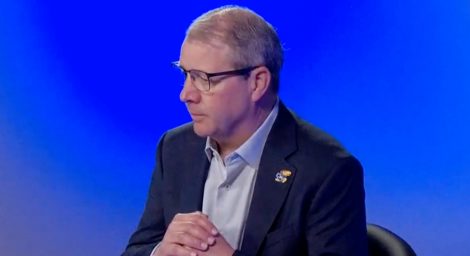KU to require COVID vaccination for all employees by Dec. 8; move needed to comply with federal order for contractors

photo by: Screenshot/KU Health System
University of Kansas Chancellor Douglas Girod speaks during a KU Health System webcast Tuesday, May 26, 2020.
All University of Kansas employees will need to be fully vaccinated by Dec. 8 or risk losing their jobs, KU announced Friday.
Chancellor Douglas Girod said it is now clear that KU must comply with an executive order from President Joe Biden that requires full vaccination of employees who are working on projects or at locations involved in completing federal contracts.
“Because of the scope of the federal order, this mandate applies to all KU employees – including student employees – on all campuses and in all KU affiliates and auxiliaries, unless an employee applies for and receives a religious or medical exemption,” Girod said in a message to employees Friday. “Employees who do not comply with the vaccine requirement are subject to disciplinary action up to and including termination from employment.”
The rules for federal contractors do not allow employees to forgo the vaccine as long as they get tested. That is different from a separate executive order Biden signed that requires vaccinations for workers who are employed at companies with more than 100 employees. That order allows employees to take frequent tests to prove they do not have the virus. The federal order also doesn’t allow people who can prove they’ve had COVID to forgo vaccination.
Medical or religious exemptions can be granted, and KU said it would provide information in the days ahead on how to apply for an exemption. The university also will detail how employees can upload a proof of vaccination card to KU.
While those details are to come, KU said it was urging its unvaccinated employees to act fast to get their first dose of the vaccine. Due to the amount of time it takes for a two-dose vaccine to become fully activated, employees may have a short window to get their first vaccine and be assured that the vaccination process will be completed by Dec. 8.
For example, KU estimates that employees who want to receive the Moderna vaccine would need to get their first shot by Oct. 27 in order to have enough time to be fully vaccinated by the Dec. 8 deadline. The Pfizer vaccine would require a first dose by Nov. 3, KU estimates, while the one-shot Johnson & Johnson vaccine could be taken as late as Nov. 24.
KU estimates about 80% of its roughly 13,000 full- and part-time employees already are vaccinated.
Girod said it was determined that KU qualifies as a federal contractor under the executive order and thus must comply with the vaccine mandate. Girod said the Kansas Board of Regents has made a determination that KU falls under the executive order. Girod said KU also had consultations with federal and state partners on the matter.
“KU participates in millions of dollars in federal contracts that fund research, employment and educational efforts — all of which are at risk if we are not aligned with the executive order,” Girod said in his written message to employees. “For this reason, we cannot be flexible with employees who choose not to comply with the vaccine requirement.”
Kansas State University and Wichita State University on Friday made a similar announcement requiring vaccination for employees, citing the same executive order involving federal contractors. Emporia State University and Fort Hays are not required to follow the mandate because they do not have federal contracts, according to The Associated Press, and Pittsburg State officials said they were reviewing the requirements and would have comment later.
While there are many KU employees who work directly on federal research, there are many employees who also do not conduct any work as part of a federal contract. However, even employees who aren’t directly involved with federal contract work will be required to get vaccinated.
A fact sheet the federal government has put out about the executive order defines a covered contractor employee as “any full-time or part-time employee of a covered contractor working on or in connection with a covered contract or working at a covered contractor workplace. This includes employees of covered contractors who are not themselves working on or in connection with a covered contract.”
That definition essentially required all KU employees to be classified as a covered employee under the order, since KU does some federal contract work at all of its campuses.
The vaccine mandate will not apply to students, unless those students also are working for the university. State lawmakers previously had passed a bill prohibiting any state agency from requiring proof of vaccination in order to receive state services. KU has contended that state law prohibits the university from requiring students to be vaccinated for COVID.
The federal executive order does not change the state law as it relates to students who are not employees of the university. But KU and other leaders have seemingly determined the state law does not exempt KU from complying with the federal executive order as it relates to employees.
KU only briefly addressed that issue in its message to employees.
“We will continue to work with KBOR (Kansas Board of Regents) and state lawmakers to address discrepancies between state law and the federal order,” an FAQ section that accompanied Girod’s message said.







